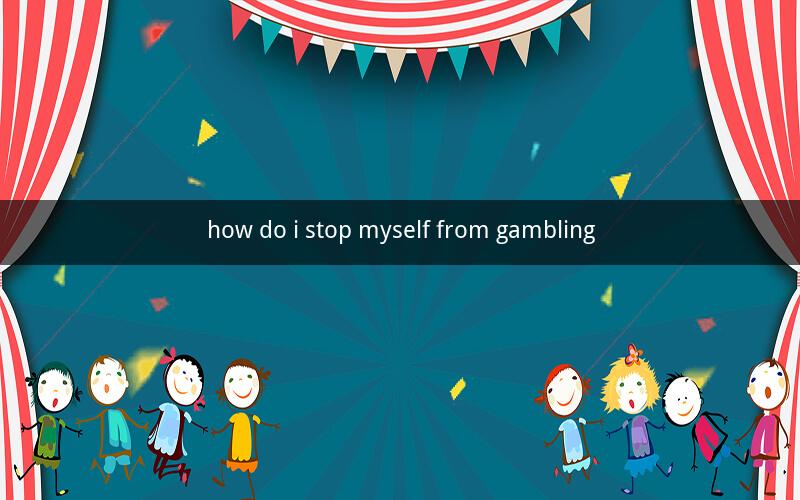
How Do I Stop Myself from Gambling?
Table of Contents
1. Understanding the Problem
2. Identifying the Triggers
3. Setting Clear Goals
4. Developing a Support System
5. Budgeting and Financial Management
6. Time Management and Hobbies
7. Professional Help and Therapy
8. Self-Reflection and Journaling
9. Technology and Online Tools
10. Staying Accountable and Monitoring Progress
1. Understanding the Problem
Gambling addiction is a complex issue that affects millions of people worldwide. It's essential to understand the nature of the problem before attempting to overcome it. Gambling addiction is characterized by an inability to control the urge to gamble, despite negative consequences. It can lead to financial, emotional, and social problems. Recognizing the signs of gambling addiction is the first step towards recovery.
2. Identifying the Triggers
Identifying the triggers that lead to gambling is crucial in preventing relapse. Triggers can be emotional, environmental, or social. Emotional triggers may include stress, anxiety, or boredom. Environmental triggers can be places or situations that remind you of gambling. Social triggers may involve friends or family members who encourage gambling. By identifying these triggers, you can take steps to avoid them or develop coping strategies.
3. Setting Clear Goals
Setting clear, achievable goals is essential in overcoming gambling addiction. Goals should be specific, measurable, attainable, relevant, and time-bound (SMART). For example, a goal could be to stop gambling for one month or to reduce the amount of money spent on gambling by 50%. Setting goals will help you stay focused and motivated throughout the recovery process.
4. Developing a Support System
A strong support system can make a significant difference in overcoming gambling addiction. This can include friends, family, support groups, or professionals. Support groups such as Gamblers Anonymous can provide a sense of community and understanding. Sharing your experiences and receiving encouragement from others who have faced similar challenges can be incredibly beneficial.
5. Budgeting and Financial Management
Budgeting and financial management are vital in preventing gambling-related debt. Create a budget that allocates funds for necessary expenses and sets aside money for emergencies. Avoid using credit cards or loans to fund gambling activities. Consider seeking financial counseling to help manage your finances and overcome any existing debt.
6. Time Management and Hobbies
Finding healthy alternatives to gambling can help fill the void left by this addiction. Engaging in hobbies, exercising, and spending time with loved ones can provide a sense of fulfillment and distraction from the urge to gamble. Time management techniques can help you stay organized and focused on your goals.
7. Professional Help and Therapy
Professional help, such as therapy or counseling, can be invaluable in overcoming gambling addiction. Therapists can provide personalized strategies to cope with triggers and develop healthy habits. Treatment options may include cognitive-behavioral therapy, group therapy, or residential programs.
8. Self-Reflection and Journaling
Self-reflection and journaling can help you track your progress and identify patterns in your gambling behavior. Writing down your thoughts, feelings, and experiences can provide insight into the underlying causes of your addiction. This can also help you stay motivated and committed to your recovery journey.
9. Technology and Online Tools
Technology can be both a tool for addiction and a tool for recovery. Utilize online resources, apps, and websites that offer support and guidance for overcoming gambling addiction. Some apps can help you track your gambling behavior and provide reminders to stay on track with your goals.
10. Staying Accountable and Monitoring Progress
Staying accountable and monitoring your progress is essential in maintaining long-term recovery. Consider sharing your goals with someone you trust and ask them to hold you accountable. Regularly review your progress and adjust your strategies as needed. Celebrate your successes, no matter how small, to stay motivated.
FAQs
1. What are the signs of gambling addiction?
- Signs include preoccupation with gambling, increasing the amount of money or time spent gambling, lying about gambling activities, and experiencing negative consequences as a result of gambling.
2. How can I identify my gambling triggers?
- Reflect on situations, emotions, or people that make you want to gamble. Keep a journal to track these triggers and their effects.
3. What are some healthy alternatives to gambling?
- Engage in hobbies, exercise, read, learn a new skill, or spend time with friends and family.
4. Can therapy help with gambling addiction?
- Yes, therapy can provide personalized strategies to cope with triggers and develop healthy habits.
5. How can I create a budget to manage my finances?
- List your income and expenses, prioritize necessary expenses, and allocate funds for savings and emergencies.
6. Are there any support groups for gambling addiction?
- Yes, Gamblers Anonymous and other support groups can provide community and understanding.
7. How can I stay motivated during the recovery process?
- Set SMART goals, celebrate small successes, and surround yourself with a supportive network.
8. Can technology help with overcoming gambling addiction?
- Yes, there are apps and online resources that can help you track your progress and provide support.
9. What should I do if I relapse?
- Acknowledge the relapse, analyze what led to it, and seek support from your support system or professionals.
10. How long does it take to overcome gambling addiction?
- Recovery is a unique journey for each individual, and there is no set timeline. Some may recover quickly, while others may take longer. The key is to stay committed and persistent.